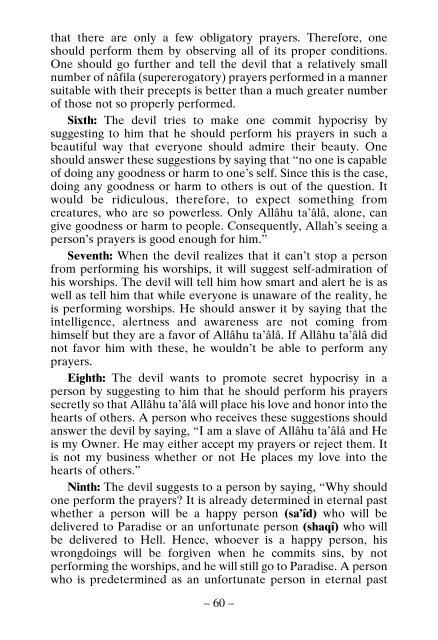Ethics of Islam
Ethics of Islam is taken from the book Berîka by Muhammad Hâdimi. Immorality and ways to get rid of it; 40 depravities and cures to them; usefulness of ethics; what is a soul; strengths of a soul; Personalities emanating from wisdom, courage, chastity and justice are extensively explained.
Ethics of Islam is taken from the book Berîka by Muhammad Hâdimi. Immorality and ways to get rid of it; 40 depravities and cures to them; usefulness of ethics; what is a soul; strengths of a soul; Personalities emanating from wisdom, courage, chastity and justice are extensively explained.
Create successful ePaper yourself
Turn your PDF publications into a flip-book with our unique Google optimized e-Paper software.
that there are only a few obligatory prayers. Therefore, one<br />
should perform them by observing all <strong>of</strong> its proper conditions.<br />
One should go further and tell the devil that a relatively small<br />
number <strong>of</strong> nâfila (supererogatory) prayers performed in a manner<br />
suitable with their precepts is better than a much greater number<br />
<strong>of</strong> those not so properly performed.<br />
Sixth: The devil tries to make one commit hypocrisy by<br />
suggesting to him that he should perform his prayers in such a<br />
beautiful way that everyone should admire their beauty. One<br />
should answer these suggestions by saying that “no one is capable<br />
<strong>of</strong> doing any goodness or harm to one’s self. Since this is the case,<br />
doing any goodness or harm to others is out <strong>of</strong> the question. It<br />
would be ridiculous, therefore, to expect something from<br />
creatures, who are so powerless. Only Allâhu ta’âlâ, alone, can<br />
give goodness or harm to people. Consequently, Allah’s seeing a<br />
person’s prayers is good enough for him.”<br />
Seventh: When the devil realizes that it can’t stop a person<br />
from performing his worships, it will suggest self-admiration <strong>of</strong><br />
his worships. The devil will tell him how smart and alert he is as<br />
well as tell him that while everyone is unaware <strong>of</strong> the reality, he<br />
is performing worships. He should answer it by saying that the<br />
intelligence, alertness and awareness are not coming from<br />
himself but they are a favor <strong>of</strong> Allâhu ta’âlâ. If Allâhu ta’âlâ did<br />
not favor him with these, he wouldn’t be able to perform any<br />
prayers.<br />
Eighth: The devil wants to promote secret hypocrisy in a<br />
person by suggesting to him that he should perform his prayers<br />
secretly so that Allâhu ta’âlâ will place his love and honor into the<br />
hearts <strong>of</strong> others. A person who receives these suggestions should<br />
answer the devil by saying, “I am a slave <strong>of</strong> Allâhu ta’âlâ and He<br />
is my Owner. He may either accept my prayers or reject them. It<br />
is not my business whether or not He places my love into the<br />
hearts <strong>of</strong> others.”<br />
Ninth: The devil suggests to a person by saying, “Why should<br />
one perform the prayers? It is already determined in eternal past<br />
whether a person will be a happy person (sa’îd) who will be<br />
delivered to Paradise or an unfortunate person (shaqî) who will<br />
be delivered to Hell. Hence, whoever is a happy person, his<br />
wrongdoings will be forgiven when he commits sins, by not<br />
performing the worships, and he will still go to Paradise. A person<br />
who is predetermined as an unfortunate person in eternal past<br />
– 60 –

















